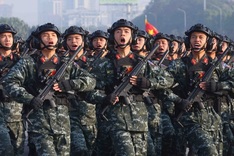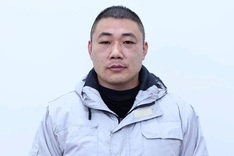Vietnam’s new cabinet makes a strong start with several “smart technocrats”, but economic woes and lack of transparency pose hurdles, according to analysts
 |
| Residents fishing next to Han River bridge in central coastal city of Da Nang. New Transport Minister Dinh La Thang last week took the unusual step of firing the manager of a local airport project after finding it was lagging far behind its deadline. |
After a brief phone call, it was settled. He was history.
Dang Hong Cuong would no longer head the new terminal construction project at the Da Nang International Airport as of October 7.
The decision to fire Cuong was made at the construction site by Transport Minister Dinh La Thang, who was inspecting progress on the project last week, only to realize that it had been lagging far behind its deadline. Launched in December 2007, the US$64.6 million project was scheduled to open in the first quarter last year.
Thang made a phone call from the site and appointed Do Tat Binh, deputy general director of the Southern Airports Corporation at the time, as the new head of the project.
Thang also urged contractors to hasten work to wrap up the project by the end of this year, adding that he would not brook any other delay.
Such a rare move against a major project manager has put Thang in the headlines as delays and cost overruns have bogged down the country’s infrastructure development, and have become hot-button issues around the country.
Installed as new transport minister in August, with the second lowest vote in the National Assembly, Vietnam’s legislature, the former chairman of the Vietnam Oil and Gas Group (PetroVietnam) has received a lot of publicity since.
Immediately following his appointment, Thang said the construction of a controversial US$56-billion bullet train connecting Hanoi and HCMC would not be implemented in the next five years and he rammed home the message that his top priorities would be to improve overloaded infrastructure, clear clogged streets, and reduce traffic accidents which killed at least 11,000 people last year.
Thang said the Da Nang incident had not been the only case in which he had fired the contractors for delaying the project. Thang also stressed that what he did was not meant to show off to gain public kudos.
“I have received some text messages chiding me for what I have done,” Thang was quoted by the Tuoi Tre (Youth) newspaper as saying in an interview last weekend. “I just don’t care about it… My established position is that I will always stick to what I believe is right.
“I cannot go ahead with my plans if I always look to please everyone.”
Readers who posted their views on the Tuoi Tre online news site have hailed Thang as “brave,” “steadfast,” and “no-nonsense.”
‘Slowly evolving’
Carl Thayer, an Australia-based veteran Vietnam analyst, said that Thang, 51, holds a “sensitive portfolio” because the new elite in Vietnam are as upset as anyone in Vietnam about the country’s traffic problems.
“Thang is obviously acting with approval to portray cabinet ministers as dynamic,” Thayer said.
Indeed, several new faces in the cabinet have been touted as hopeful inspirations that could streamline policymaking during a rough patch in which the economy is wresting with one of the world’s highest inflation rates – it climbed 22.42 percent in September from a year earlier, compared with 23.02 percent in August.
Last month, the Finance Ministry sent out three inspection teams to look into oil product prices at major fuel traders after a heated debate between government officials over whether the firms are really suffering the losses they’ve been reporting. The inspection was launched because officials of the Finance Ministry and the Ministry of Industry and Trade were at odds on the recent 2.3 percent cut in retail oil product prices. Before the inspections, Finance Minister Vuong Dinh Hue said Petrolimex, the country’s largest fuel trader with a market share of around 60 percent, was actually making profits.
The Ministry of Finance has recently become tougher with fuel companies.
But Jonathan Pincus, Dean of the Fulbright Economics Teaching Program in Ho Chi Minh City, said that even if the Finance Minister sent 100 inspection teams to audit petrol companies, the results might be inconclusive.
“The problem with this approach is that it is nearly impossible for an outsider to distinguish between necessary and unnecessary costs, and between actual and inflated costs and in-between,” Pincus said. “They would all come back with different answers.
“I would therefore recommend that the Minister allow fuel traders to compete on price rather than send out auditors. The public will get cheaper fuel, and the fuel companies will have to reduce their costs.”
Finance Minister Hue, a former state auditor, is a Slovakian-trained professor with expertise in accounting, auditing, and state budgeting. Analysts in the field say Hue is armed with facts and figures and a mandate to correct the inefficiencies of large state-owned enterprises, and oversee economic adjustments to rein in inflation and stabilize the Vietnamese dong.
Hue is joined in this effort by Nguyen Van Binh, 50, a Russian-trained technocrat who has been the governor of the State Bank of Vietnam since August. Binh has exhibited determination to continue tight monetary policies, placing an emphasis on containing inflation.
Matt Hildebrandt, a Singapore-based economist at JP Morgan Chase & Co, said the government must have strong, well-educated technocrats in leadership positions with the freedom to pursue sound and well-designed economic policies.
“Appointing smart technocrats to head the Ministry of Finance and the State of Bank of Vietnam is a good start, but it is just the beginning,” Hildebrandt said.
“These officials must also be allowed to pursue policies that allow them to improve transparency, reduce corruption, liberalize the economy, and maintain and improve macroeconomic stability.”
“Vietnamese political culture is slowly evolving from era of collective responsibility to ministerial responsibility,” Thayer said.
Fingers crossed
While some observers are hoping the cabinet reshuffle will result in clearer, more consistent economic policy and lead to medium-term economic stability, others are less quick to view it as a watershed.
With more than two-thirds of the cabinet seats unchanged or passed to deputies, analysts say that the current cabinet represents more continuity with past policies than it reflects change in the direction of deep reforms.
Communist Party chief Nguyen Phu Trong said at a meeting of the Party Central Committee this week that Vietnam must prioritize the restructuring of the economy and the redesigning of the country’s growth model over the next five years.
Zachary Abuza, a Southeast Asia analyst at the National War College in Washington, noted that he was sympathetic to any political leader trying to figure out the global economy right now.
“The best economic minds in the world are befuddled. I understand the cautious approach, even if in crisis it is actually bold steps that are necessary,” Abuza said.
“Without changes in personnel you rarely get changes in policy.”
Thayer, the Australian expert, said many Vietnamese ministerial initiatives address issues that reflect public concern, but the execution of policy is not always transparent.
“It is sometimes difficult to know whose interests are being served – the national interest or the smaller interests of those who benefit from current policy,” Thayer said.
“In some cases policy may reflect entrenched interests.”




















